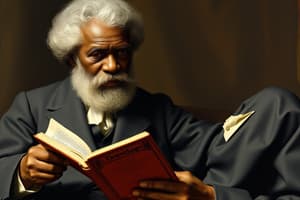Podcast
Questions and Answers
What does the narrator's description of the valuation process reveal about the nature of slavery?
What does the narrator's description of the valuation process reveal about the nature of slavery?
- It provided opportunities for enslaved people to negotiate their freedom.
- It was a fair and just system of wealth distribution after the master's death.
- It aimed to improve the living conditions of enslaved people by assessing their worth.
- It reinforced the idea that enslaved people were considered property, not humans. (correct)
How did the death of Captain Anthony and the subsequent valuation of his property affect the narrator's understanding of his status?
How did the death of Captain Anthony and the subsequent valuation of his property affect the narrator's understanding of his status?
- It caused him to become completely numb to the suffering and injustice of slavery.
- It made him feel more hopeful about the possibility of gaining his freedom soon.
- It deepened his awareness of his degraded condition as a slave and the brutality of the system. (correct)
- It motivated him to form closer relationships with other enslaved people in order to cope with his situation..
Why might the narrator's return to his birthplace after five years evoke mixed emotions?
Why might the narrator's return to his birthplace after five years evoke mixed emotions?
- He associated the place with both early childhood memories and the harsh reality of his enslavement. (correct)
- He was eager to reunite with his family, knowing they would be free from slavery.
- He knew he would inherit property there, guaranteeing him a better future.
- He was confident it meant he would be sold to a kinder master.
What does the phrase 'silvery-headed age and sprightly youth, maids and matrons, had to undergo the same indelicate inspection' suggest about slavery?
What does the phrase 'silvery-headed age and sprightly youth, maids and matrons, had to undergo the same indelicate inspection' suggest about slavery?
What can be inferred from the narrator taking passage on the schooner Wild Cat with Captain Rowe?
What can be inferred from the narrator taking passage on the schooner Wild Cat with Captain Rowe?
Flashcards
Estate Division
Estate Division
Captain Anthony's estate was divided between his son Andrew and daughter Lucretia after his unexpected death without a will.
Valuation of Slaves
Valuation of Slaves
Enslaved people were valued alongside livestock and other property to divide the estate's assets.
Dehumanizing Inspection
Dehumanizing Inspection
The valuation process involved detailed and dehumanizing inspections of enslaved individuals, regardless of age or status.
Realization of Degradation
Realization of Degradation
Signup and view all the flashcards
Brutalizing Effects of Slavery
Brutalizing Effects of Slavery
Signup and view all the flashcards
Study Notes
- After moving to Baltimore the youngest son of the old master, Richard, passed away.
- About three years and six months following Richard's death, Captain Anthony, the old master died.
- Captain Anthony left behind his son Andrew, and daughter, Lucretia inheriting his estate.
- Captain Anthony died unexpectedly during a visit to his daughter in Hillsborough.
- Because Captain Anthony unexpectedly died, he didn't leave a will.
- Without a will a property valuation needed to occur to divide the estate between Mrs. Lucretia and Master Andrew
- The narrator was sent for, to be valued along with the other property.
- The narrator's feelings rose up in detestation of slavery.
- The narrator had a new perception of his degraded condition.
- Prior to this, he had become, if not insensible to his lot, at least partly so.
- The narrator left Baltimore with a young heart overcome with sadness, and a soul full of apprehension.
- The narrator took passage with Captain Rowe, in the schooner Wild Cat.
- After a sailing of about twenty-four hours, found himself near the place of his birth.
- The narrator had been absent from it for almost five years
- When he left, he was about five years old to go and live with his old master on Colonel Lloyd's plantation.
- The narrator was between ten and eleven years old.
- All men and women, old and young, married and single were ranked together with horses, sheep, and swine.
- There were horses and men, cattle and women, pigs and children, all holding the same rank in the scale of being.
- Silvery-headed age and sprightly youth, maids and matrons, had to undergo the same narrow examination.
- The narrator recognizes more clearly the brutalizing effects of slavery upon both slave and slaveholder.
Studying That Suits You
Use AI to generate personalized quizzes and flashcards to suit your learning preferences.




